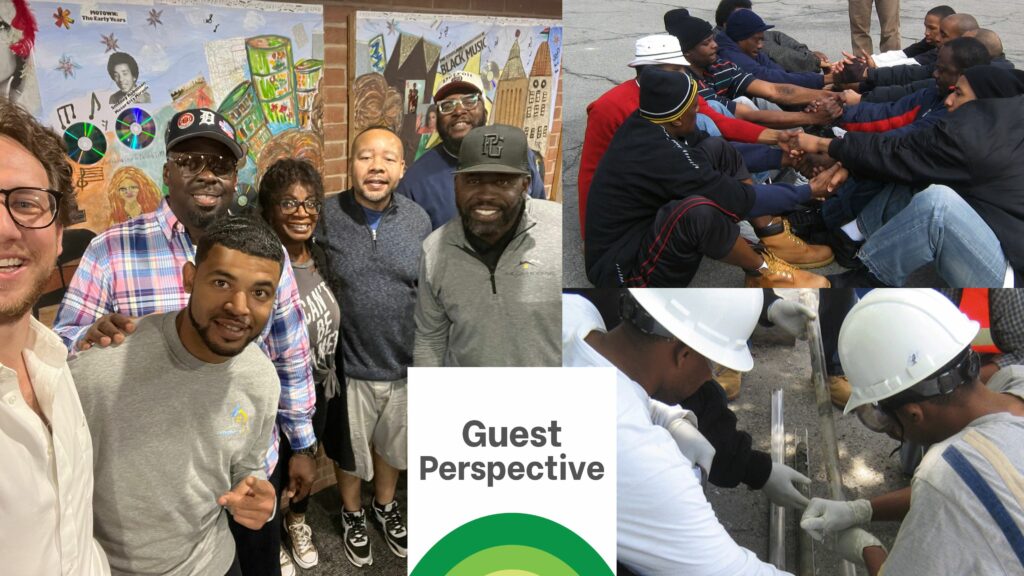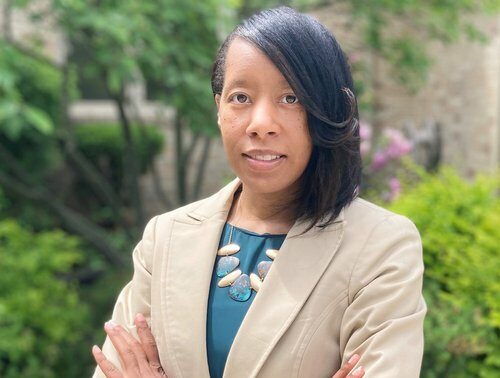Detroiters Working for Environmental Justice’s Vision for Sustainability

LAPRISHA BERRY DANIELS IS EXECUTIVE DIRECTOR OF DETROITERS WORKING FOR ENVIRONMENTAL JUSTICE AND A LEADERSHIP COMMITTEE MEMBER FOR SUSTAINABLE BUSINESS NETWORK DETROIT DWEJ’s vision for sustainability is rooted in the three pillars of sustainability: health and happiness of community members, a healthy local environment free from hazards and harm, and economic vitality. As an organization that focuses on environmental justice and strives to have the voice of the community-centered as decisions are being made that impact their health (physical, mental, spiritual, and economic), we assert that community members can envision and create healthy communities that meet their immediate and distal needs. A healthy community is one in which all systems work together to support the health and well-being of all its members. Local businesses are part of the community’s ecosystem and thus play a unique role in supporting the health and well-being of the community. Ideally, the relationship between community members and local business is mutually beneficial as they prioritize health and co-create a healthy community. Local businesses and community members can work together to identify threats to community well-being and create strategies to address challenges. In Detroit, and beyond, climate change threatens our ability to achieve and maintain physical, mental, spiritual, and economic health. As we experience more extreme weather locally, such as extreme heat and annual “100-year floods”, we recognize that our built environment may not be able to weather the storm (pun intended). Unfortunately, our existing residential housing stock and current construction practices are too often ill-suited for current and future climate conditions. The mismatch between what is available and what is needed creates threats to the health of people and planet. DWEJ developed a contractor accelerator program that focuses on contractors increasing their awareness about ways to improve the built environment to mitigate risks related to climate change while centering sustainability. DWEJ’s contractor accelerator program, Building Health, serves as an incubator to support peer-to-peer learning among Detroit-based, Detroit-serving contractors of color. Building Health increases contractors’ awareness and implementation of “environmentally responsible and resource-efficient” practices that have: Bottom-line business benefits Individual and community health benefits Decrease environmental degradation. Building Health increases contractors’ understanding of the impact they can have on health. For example, participating contractors are presented with strategies for upgrading and greening residential housing in ways that include the use of various building methods and materials that can make homes more energy efficient. These improvements decrease greenhouse gas emissions, improve the health and comfort of the home, and improve the economic health of the occupants by reducing the cost of utility use. Participants receive financial and technical assistance to implement practices as part of the program as well. Additionally, contractors learn how to best communicate the benefits of sustainable repair and rehab practices to clients. The role of local contractors is just one example of the opportunity our community has to transform our ecosystem and economy for the better. There is a unique and distinct role that local business plays in supporting people and planet. Sustainability is an iterative process where we must work collectively toward the goal of having healthy and vibrant places in which to live, learn, work, play, and pray. — Check out Laprisha Berry Daniels’s recent #TEDTalks: Lessons from the Past on Adapting to Climate Change Be sure to subscribe to our newsletter for regular updates on sustainable business practices in and around Detroit.
Detroiters Working for Environmental Justice Working Hard to Eliminate Health Disparities in Detroit

SBN Detroit talked to Laprisha Berry Daniels, Executive Director of Detroiters Working for Environmental Justice (DWEJ), an environmental/social justice organization committed to community engagement and policy change that lifts the voices of Detroiters. Daniels holds a bachelor’s degree in psychology from Michigan State University, as well as master’s degrees in social work and public health from the University of Michigan. With over 20 years of public health experience, she has been responsible for developing, implementing, and evaluating efforts focused on eliminating some of the most stubborn health disparities. Here she shares her thoughts and work in disrupting and dismantling the status quo to ultimately eliminate environmental health disparities in Detroit. Q: In June 2021 you took on the role of executive director for Detroiters Working for Environmental Justice. What is involved here? A: The work of Detroiters Working for Environmental Justice (DWEJ) started over 30 years ago. The vision then and now is to make certain all people benefit from environmental policies and practices that value the voices and reflect the will of impacted communities. As the executive director, I work with internal and external partners to challenge structures/systems that perpetuate racist and classist policies that negatively impact the well-being of Detroit and Detroiters. DWEJ is currently working with national organizers and local champions to push for adding a Green Amendment to the state’s constitution. Q: What are your short-term and longer-term goals and how will you reach them? A: DWEJ currently focuses on reducing environmental health disparities, specifically those related to asthma, lead poisoning, and cardiovascular disease (CVD). Our approaches to reducing these disparities involve combining education about illness related to environmental hazards with political action to reduce the environmental factors that lead to disease. Two recent efforts involved engaging community members around making public comments – first, at Detroit city council meetings to object to proposed changes in a rental ordinance that would put more children at risk for having elevated blood lead levels that compromise the physical and mental health of children and pregnant persons, and second, before the zoning appeals board to urge officials to protect the health and well-being of residents by denying a permit to have a new asphalt facility in northwest Detroit. Overall, we focus collaboration, outreach, education, and advocacy efforts on improving the natural and built environment so that the physical, spiritual, mental, and economic health of Detroiters is improved, protected, and maintained. Q: What are the biggest challenges? A: If Detroit is going to be a model city for sustainability, nonprofits, for-profits, industry, education systems, health systems, government, art institutions, etc. – and I think we can be – we must all work together as we look for creative and innovative solutions to challenges. We must honor the ideas, perspectives, voices, actions, and leadership of the communities impacted by decisions that are being made. We must listen to the people in the areas we work in – the daily issues that impact their lives. Q: What drives your passion here? A: I believe that anyone, anywhere can collaborate for the greater good. I have been part of some unlikely alliances that have created transformative change. For example, in previous work, I was responsible for recruiting volunteers ages 55 and up to read to elementary school students. I facilitated relationships with local motorcycle clubs and had bearded, tatted bikers volunteering to read to third graders, encouraging academic achievement and helping to improve school climate. I’m ready to be part of that process as we focus on transforming the way we collectively “do business” as consumers and producers in Detroit. Q: From your perspective – what is the role of businesses in Detroit in terms of sustainability overall for the city? Businesses of all sizes with varying goals, visions, and missions can engage in co-learning, collaboration, and collective action. Many of the challenges that we are facing are the result of a few making decisions that will impact many. Therein lies the problem. The biggest challenge to sustainability, in business and beyond, is clinging to the status quo or “business as usual.” We have to engage in some business that is unusual. For far too long the blame for environmental woes and the measures to fix the issues have been passed on to individuals. We can shift the conversation from asking individuals to reduce, reuse, and recycle to expecting businesses, especially big businesses, to respect, restore, and replenish. Q: What are businesses in Detroit that are doing it well? A: Pingree Detroit comes to mind when I think of sustainability, innovation, creativity, and collaboration. They serve as a prime example of how businesses of varying sizes that have varying impacts on the ecosystem can partner. Be sure to subscribe to our newsletter for regular updates on sustainable business practices in and around Detroit.


